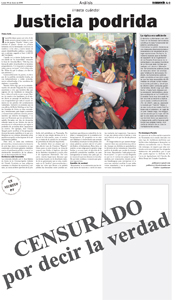New York, June 14, 2010—The Committee to Protect Journalists condemns the nearly four-year prison term given to Venezuelan columnist Francisco “Pancho” Pérez on defamation charges, according to local news reports and CPJ’s interviews.
On Friday, a court in Carabobo found Pérez, a columnist with the daily El Carabobeño, guilty of defaming Valencia’s mayor Edgardo Parra, the local press reported. He was sentenced to three years and nine months. In two columns published in October and November 2009, Pérez accused the mayor of appointing relatives to positions in Valencia, Antonio Marval, the columnist’s lawyer, told CPJ.
Since the jail term is shorter than five years, Venezuelan law allows the columnist to serve the sentence at home, Marval said. The court also banned Pérez from working in journalism for the length of the sentence, and fined him 94,000 Venezuelan Bolivars (US$21,000), El Carabobeno reported. Pérez told CPJ that he will appeal the decision.
“We condemn Pérez’s sentence and call on the court of appeals to overturn the decision,” said Carlos Lauría, CPJ’s Americas program senior coordinator. “Venezuela’s defamation laws are out of step with the regional consensus that civil remedies provide adequate redress in defamation cases.”
In yet another troubling incident on Friday, Venezuelan authorities issued arrest warrants for Guillermo Zuloaga, president of the private critical broadcaster Globovisión, and his son on usury and conspiracy charges. The decision came a week after President Hugo Chávez publicly lamented that Zuloaga remained free despite charges filed against him over 24 vehicles found to be illegally kept at his house in May 2009. Police have not yet arrested Zuloaga.
“If the government is using Zuloaga’s prosecution as a pretext to silence and intimidate the only remaining critical broadcaster, the rights of citizens to be informed will be seriously restricted and Venezuela’s democracy will suffer yet another blow,” said Lauría.
On March 25, Zuloaga was detained and released a few hours later on charges of spreading false news and offending Chávez in remarks made during a meeting of the Inter American Press Association on March 21. He has been barred from leaving Venezuela and, if convicted, could be sentenced to five years in jail under archaic provisions of the country’s penal code.
Globovisión has been targeted by a barrage of government investigations and attacks by pro-government militants in the past year.
